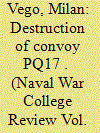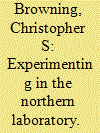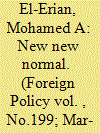| Srl | Item |
| 1 |
ID:
146451


|
|
|
|
|
| Summary/Abstract |
The most critical problem for the Western Allies in the northern European theater in 1941–42 was the urgent need to secure the war matériel being sent to the Soviet Union. Initially, the Germans did not react strongly against the Allied convoys sailing to northern Russia.
|
|
|
|
|
|
|
|
|
|
|
|
|
|
|
|
| 2 |
ID:
101008


|
|
|
|
|
| Publication |
2010.
|
| Summary/Abstract |
This article explores the changing nature of security governance in Northern Europe since the end of the Cold War. Prior to enlargement in 2004 European Union (EU) involvement in the region was limited and cautious, with security governance driven predominantly by regional actors. At the same time, the connection between 'security' and projects of 'regional cooperation' was complex and largely interdependent. Since 2004 the EU has become more engaged in the region, most recently through its new Strategy for the Baltic Sea Region via which the north is conceptualised as a possible test case for broader conceptions of regional governance in Europe. The article argues that such developments raise significant questions, not only for the future and nature of regional security conceptions in the north, but also in respect of how the EU conceptualises itself in relation to security more generally.
|
|
|
|
|
|
|
|
|
|
|
|
|
|
|
|
| 3 |
ID:
193527


|
|
|
|
|
| Summary/Abstract |
This article seeks to theorize the transformation of the armed forces in Northern Europe by examining its drivers during previous NATO enlargements in the region. The exploration includes the German reunification in 1990, the Polish entry in 1999, and the joining of the three Baltic States, i.e., Estonia, Latvia, and Lithuania, in 2004. Based on these experiences, the article identifies some theoretical considerations for transformation in conjunction with the current accession process of Finland and Sweden. Based on a realist logic, we conclude that the ongoing transformation should be underpinned by a new operational design, hence considering the need for flexibility and for managing potential new expeditionary shocks. To this end, we argue that the focus must initially be internally within the Alliance, i.e., to proceed with novel operational planning for northern Europe before turning the attention to the transformation of the armed forces of the new members.
|
|
|
|
|
|
|
|
|
|
|
|
|
|
|
|
| 4 |
ID:
118065


|
|
|
| 5 |
ID:
079902


|
|
|
|
|
| Publication |
2007.
|
| Summary/Abstract |
This article enters the recent debate on the decline in the features of international society within the current system by looking at the case of Russia; a case that has, to date, received little attention. Russia is considered one of the great powers. It is also characterised by a long-standing quest for membership in international society. In addition, Russia merits closer attention as a result of its strategic partnership with the EU. The EU offers Russia access to regional-level international societies with a thicker set of institutions than are available in its relations with the United States and Asia. The fact that Russia identifies itself with Europe has driven it to experiment with some of the solidarist institutions typifying EU-centred societies, most notably the market. As a result there are tangible prospects for maintaining and even expanding the features of international society at the level of greater Europe regardless of the systemic constraints
|
|
|
|
|
|
|
|
|
|
|
|
|
|
|
|